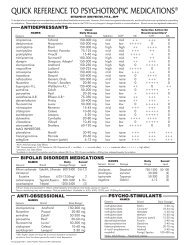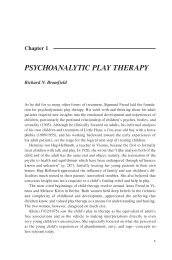IRAQ WAR CLINICIAN GUIDE
Iraq War Clinician's Guide - Network Of Care
Iraq War Clinician's Guide - Network Of Care
You also want an ePaper? Increase the reach of your titles
YUMPU automatically turns print PDFs into web optimized ePapers that Google loves.
-Iraq War Clinician Guide 53 Traumatized Amputee<br />
P P<br />
confrontation and irrelevant insights. Focusing initially on concrete discussions related to the<br />
physical injuries, treatments and the healing process appears to be beneficial.<br />
P<br />
The Therapeutic Alliance and Therapeutic Interactions<br />
The therapeutic alliance with the patient is key to successful treatment response. Anecdotally,<br />
clinicians observe that the better the relationship between the PMP clinician and the patient, the<br />
more helpful the intervention seems to be. The importance of developing a positive therapeutic<br />
relationship may be even greater in medical-surgical patients given their natural tendency to be<br />
skeptical of psychiatric involvement. As a good relationship develops, the patient begins to see the<br />
clinician more as an advocate who can be helpful. PMP team members have suggested that<br />
patients who develop good therapeutic relationships with providers are more likely to seek<br />
assistance both during hospitalization and after discharge when problems arise. This undoubtedly<br />
would contribute to the success of any secondary or tertiary illness prevention plan.<br />
Following the development of good therapeutic relationships with their assigned clinicians,<br />
patients are then asked to recount their trauma in greater detail. They continue to be positively<br />
reinforced for their participation, their ability to describe their experiences and for the healthy<br />
behavioral choices that were made both during and after the trauma. As the patient is able to<br />
tolerate greater interest in and discussion of the traumatic events, hetshe is helped to cognitively<br />
reframe distortions. Emotional conflicts are acknowledged in a supportive and compassionate<br />
manner; with the particular goal of helping build a more reality based appreciation of the<br />
traumatic events. All therapeutic involvement encourages the patient's positive acceptance of<br />
rehabilitation as well as an appreciation of hisfher clinical progress.<br />
As the treatment continues, therapeutic issues may arise in a number of areas. Amputees often<br />
have questions about whether and how relationships with friends and family members will<br />
change. Anger resulting from a variety of sources is not uncommon and will be expressed in many<br />
different forms. Clinicians must be able to tolerate and accept patient anger, recognizing it as a<br />
normal expression. Patients must be allowed to find effective and healthy ways of communicating<br />
their own frustrations so as to have their needs met, not letting these frustrations interfere with the<br />
treatment process.<br />
Later in treatment amputees may become more comfortable in addressing fears about the impact<br />
of the amputation on sexual functioning. Such worries are particularly understandable given that<br />
most of these amputees are young and many have yet to establish long-term intimate relationships,<br />
Of course every amputee faces the task of integrating a new sense of his or her body and its<br />
wholeness. The lack of confidence in body image, either due to amputation or disfigurement, is<br />
likely to have an impact on the amputee's sense of attractiveness and possibly hislher sense of<br />
sexual competence. The ability to address these issues openly and honestly reassures these<br />
patients that such concerns can be discussed and that valuable information is available.<br />
Mental health liaison with orthopedics, physical medicine, and occupational therapy becomes<br />
increasingly crucial as amputees work through rehabilitation, regain strength, and are fitted for<br />
prostheses. Liaison work with prosthetists focuses on helping amputees effectively accept and<br />
integrate the prosthesis into their new body image. For those who harbor resentment and anger<br />
about amputations, the transition to effective prosthetic use may be more difficult. Members of the<br />
PMP team have been impressed with the emotional resilience of many amputees who actively<br />
-Au& -- . -- ,- . - -a,- - &">--<br />
DEPARTMENT OF VETERANS AFFAIRS<br />
NATIONAL CEhTER FOR PTSD




